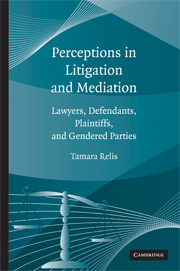Book contents
- Frontmatter
- Contents
- List of tables
- List of figures
- List of abbreviations
- Acknowledgments
- 1 Introduction
- 2 Great misconceptions or disparate perceptions of plaintiffs' litigation aims?
- 3 The voluntary versus mandatory mediation divide
- 4 Consequences of power: Legal actors versus disputants on defendants' attendance at mediation
- 5 Actors' mediation objectives: How lawyers versus parties plan to resolve their cases short of trial
- 6 Perceptions during mediations
- 7 Parallel views on mediators and styles
- 8 Conclusion: The parallel understandings and perceptions in case processing and mediation
- Bibliography
- Index
2 - Great misconceptions or disparate perceptions of plaintiffs' litigation aims?
Published online by Cambridge University Press: 21 August 2009
- Frontmatter
- Contents
- List of tables
- List of figures
- List of abbreviations
- Acknowledgments
- 1 Introduction
- 2 Great misconceptions or disparate perceptions of plaintiffs' litigation aims?
- 3 The voluntary versus mandatory mediation divide
- 4 Consequences of power: Legal actors versus disputants on defendants' attendance at mediation
- 5 Actors' mediation objectives: How lawyers versus parties plan to resolve their cases short of trial
- 6 Perceptions during mediations
- 7 Parallel views on mediators and styles
- 8 Conclusion: The parallel understandings and perceptions in case processing and mediation
- Bibliography
- Index
Summary
This chapter explores and attempts to make sense of an issue fundamental to litigation in general as well as mediation in particular: What do plaintiffs want? Why plaintiffs sue, and their consequent litigation aims should have a marked impact on their objectives and experiences in litigation and litigation-linked mediations. Likewise, as a precursor to evaluating all actors' mediation experiences one must first comprehend others' perceptions of claimants' aims, as attorneys' objectives, approaches to their cases and conduct throughout litigation, and litigation-linked mediation are affected by their basic understandings of what those who commenced these suits want; that is, what these cases were about. Moreover, understanding plaintiffs' aims is particularly important if civil justice evaluations or reforms are to be responsive to their needs. Thus, in this chapter I examine how all litigation players viewed plaintiffs' objectives as well as claimants' own discourse on what they wished to achieve.
Little is known about what litigants really want from the civil justice system and what they aim to achieve. Consequently, we have little knowledge of whether litigants' real objectives are met by the realities of civil litigation (Genn 1999, p. 11) including litigation-linked processes such as mediation. In adding to the scant body of detailed data available on litigants' dispute perceptions and their motivations for claiming, this chapter offers new insight into the area of litigants' noneconomic goals for litigation.
- Type
- Chapter
- Information
- Perceptions in Litigation and MediationLawyers, Defendants, Plaintiffs, and Gendered Parties, pp. 33 - 64Publisher: Cambridge University PressPrint publication year: 2009
- 1
- Cited by

